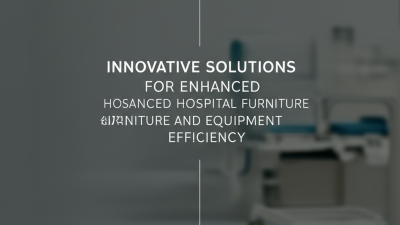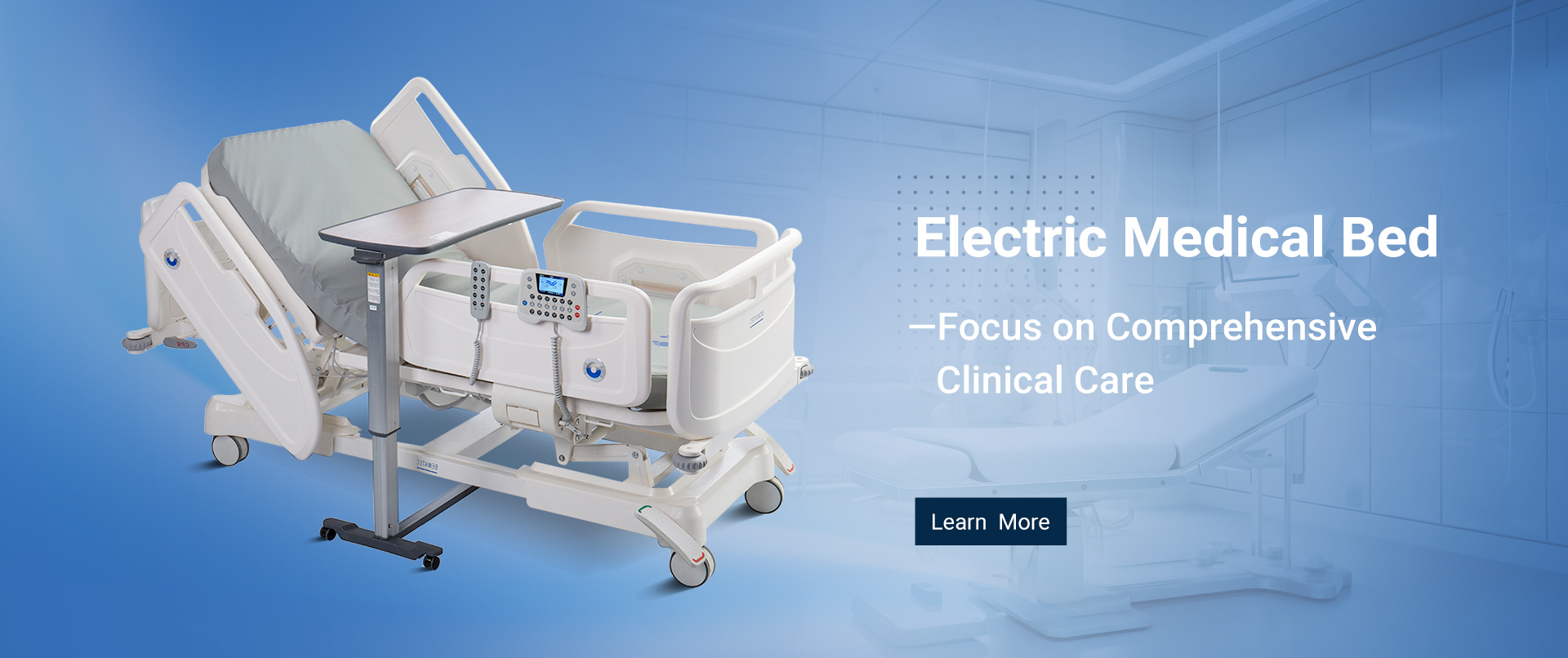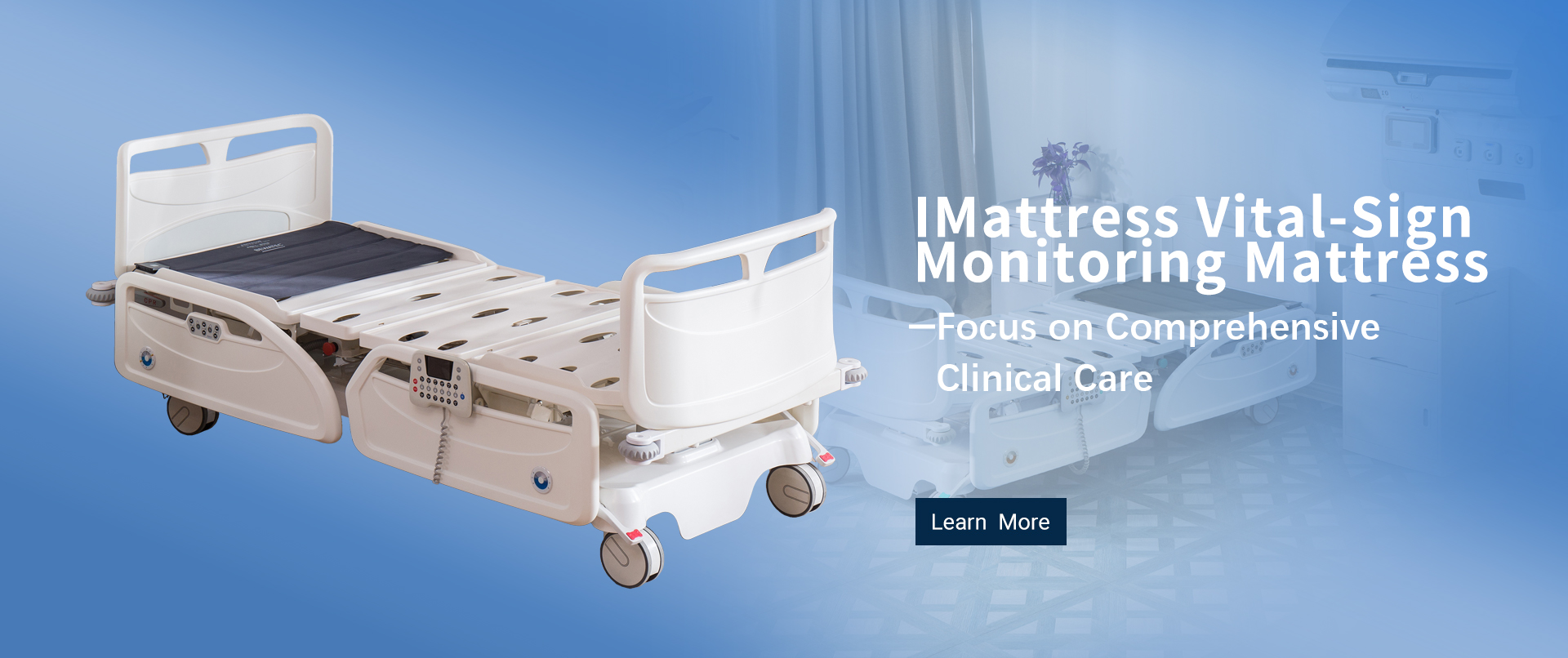
Revolutionizing Patient Care: How Technology is Transforming the Healthcare Industry
Table of Contents
- The Role of Telemedicine in Enhancing Accessibility and Efficiency
- Wearable Health Technology: Empowering Patients with Real-Time Data
- Artificial Intelligence: Revolutionizing Diagnostics and Treatment Plans
- Patient Engagement Apps: Improving Communication Between Doctors and Patients
- Big Data Analytics in Healthcare: Shaping Personalized Medicine and Public Health
- Robotic Surgery: Advancements in Precision and Patient Recovery Times
- FAQS
- Conclusion
- Related Posts
You know, in the fast-moving world of healthcare today, bringing in new technology isn’t just a nice-to-have anymore — it’s pretty much a must if we want better outcomes for patients. I read recently from Grand View Research that the global telehealth market is expected to hit around $636 billion by 2028 — seems like everyone’s really jumping on the digital health bandwagon!
 Bewatec (Zhejiang) Medical Device Co., Ltd. is definitely leading the charge here, focusing on smart medical solutions and pushing hard for the digital transformation of healthcare systems across the globe. Their goal? To offer personalized, comfortable, and safe digital care experiences. Basically, Bewatec wants to be at the forefront of these specialized smart medical solutions, designed to meet the individual needs of patients everywhere.
Bewatec (Zhejiang) Medical Device Co., Ltd. is definitely leading the charge here, focusing on smart medical solutions and pushing hard for the digital transformation of healthcare systems across the globe. Their goal? To offer personalized, comfortable, and safe digital care experiences. Basically, Bewatec wants to be at the forefront of these specialized smart medical solutions, designed to meet the individual needs of patients everywhere.
As the healthcare industry keeps embracing tech, it really becomes clear that partnerships and innovative ideas are key to making patient care better and healthcare delivery smoother overall.
The Role of Telemedicine in Enhancing Accessibility and Efficiency
Telemedicine is really changing the game when it comes to patient care. It's making healthcare more accessible and efficient than ever before. I read somewhere that, according to McKinsey & Company, telehealth usage has stabilized at about 38 times higher than before the COVID-19 pandemic, which is pretty remarkable. That surge isn't just about people wanting remote care; it’s also a sign that technology is helping break down geographical barriers, making healthcare available to many who used to be underserved. Companies like Bewatec (Zhejiang) Medical Device Co., Ltd. are playing a huge role here, offering smart medical solutions that are tailored to individual needs. Their approach makes the whole experience much more comfortable and safe for patients.
Integrating telemedicine also leads to better health outcomes — think about how it helps manage patient data more efficiently and makes communication smoother. There’s even research, like the study in the Journal of Medical Internet Research, showing that telemedicine can cut hospital readmission rates by up to 20%. Bewatec is really pushing forward with innovative tech and digital tools, empowering healthcare providers and encouraging patients to stay engaged. All in all, this new way of delivering care isn’t just about making things easier; it’s about boosting the quality of healthcare and positioning companies like Bewatec as leaders in smart, specialized medical solutions — all with accessibility and efficiency in mind for today’s world.

Wearable Health Technology: Empowering Patients with Real-Time Data
Wearable health tech is really changing the game when it comes to patient care. It’s all about giving folks real-time data that helps them take control of their health—pretty cool, right? These gadgets let you keep an eye on your vital signs, like your heart rate or glucose levels, all the time. That means you can catch potential issues early and manage health conditions before they get serious. By collecting info about your health, wearables help both patients and doctors make smarter decisions, which basically means better care overall.
If you’re looking to get the most out of your wearable, here are some tips:
- Make it a habit to sync your device regularly with its app, so you can track your progress and get personalized advice.
- Use that data to set realistic health goals—whether it’s boosting your fitness or keeping a chronic condition in check.
- Keep an eye out for updates or new features. Staying in the loop can really help you maximize what your device can do.
As tech keeps advancing, these gadgets will only become more important in healthcare. The move towards remote monitoring is a total game changer—it means doctors can keep tabs on your health without making you come into the office all the time. It’s exciting to think about how much more connected and proactive healthcare is going to get!

Artificial Intelligence: Revolutionizing Diagnostics and Treatment Plans
Artificial Intelligence, or AI, is really changing the game in healthcare these days—especially when it comes to diagnostics and planning treatments. Did you know that the global AI in Healthcare market is expected to jump from around 27 billion dollars in 2024 to a staggering 347 billion by 2032? That’s a huge jump, and honestly, it shows how deep AI’s impact really is. It’s not just about making diagnoses faster and more accurate; it’s also about personalizing treatment plans to fit each patient’s unique needs. This shift is pretty exciting because it means healthcare is becoming more patient-focused. AI is quickly becoming a key player in improving overall health outcomes.
For companies like Bewatec (Zhejiang) Medical Device Co., Ltd., jumping on the digital bandwagon is a no-brainer. They’re really committed to smart medical care, aiming to give healthcare providers tools powered by AI that make patient engagement smoother from start to finish. Whether it’s oncology or orthodontics, AI-driven applications are allowing more flexible treatment adjustments and making the whole experience better for patients. As AI keeps reshaping how medicine works, it’s pretty clear it’s going to change the way we deliver healthcare—keeping safety, comfort, and personalization right at the forefront.
All in all, it’s an exciting time for healthcare, and AI is definitely at the center of it all—making things better, faster, and more tailored to each individual.
Revolutionizing Patient Care: How Technology is Transforming the Healthcare Industry
| Dimension | Details |
|---|---|
| Current Trends | Integration of AI for diagnostics, telemedicine, and personalized medicine |
| Impact on Diagnostics | AI algorithms improve accuracy and speed of disease identification |
| Patient Engagement | Mobile apps provide real-time health monitoring and education |
| Treatment Plans | Data-driven approaches enhance precision in treatment personalization |
| Challenges | Data privacy concerns and need for physician training on new technologies |
| Future Outlook | Growing emphasis on AI Ethics and equitable access to healthcare tech |
Patient Engagement Apps: Improving Communication Between Doctors and Patients
Lately, patient engagement apps have really started to play a big role in making communication between doctors and patients a whole lot easier. I mean, according to a report from the National Center for Biotechnology Information, when communication works well, patient satisfaction can go up by about 30%, and hospital readmissions drop pretty significantly. These apps basically fill in the gaps by offering real-time updates, appointment reminders, and even direct messaging — giving patients the power to be more involved in their own healthcare. It’s pretty cool how much they can improve things!
And get this, a survey by the American Medical Association (AMA) shows that over 60% of patients actually prefer to use digital tools to chat with their healthcare providers. That’s a pretty clear sign that people want more transparency and easier access when it comes to their health. By using these patient engagement apps, doctors and clinics aren’t just making treatment plans stick — they’re also getting a better sense of what patients really need and want. In the long run, this can lead to healthier outcomes for everyone. As technology keeps moving forward, it seems like these tools are going to change the game in how healthcare providers connect with their patients and work together on health issues.
Patient Engagement Apps: Impact on Doctor-Patient Communication
Big Data Analytics in Healthcare: Shaping Personalized Medicine and Public Health
You know, the way big data analytics is transforming healthcare these days is pretty remarkable. It’s like we’re on the brink of a whole new era in both personalized medicine and public health — and it’s happening on an unprecedented scale. I came across a report from Gartner that predicts the global healthcare analytics market will hit around $50 billion by 2024. That really shows how much more hospitals and health providers are relying on data-driven decisions nowadays. This tech lets doctors and researchers dig into huge pools of data, helping them make much more accurate diagnoses and craft personalized treatment plans that really suit each patient. Thanks to big data, personalized medicine is getting better at spotting genetic markers and lifestyle factors that matter, so providers can prescribe treatments that actually work for the individual’s unique needs.
And it’s not just about individual care — big data analytics is also a game changer for public health. A study by McKinsey & Company mentioned that using data smarter can cut costs by up to 30%, while actually improving health outcomes for entire communities. By keeping an eye on data trends, health officials can catch potential outbreaks early, manage resources more efficiently, and roll out interventions grounded in solid evidence. For example, wearable gadgets and mobile health apps gather real-time data, which can then inform programs and policies at the community level. All of this adds up to healthier populations and a more efficient, responsive healthcare system — it’s pretty exciting stuff, honestly.
Robotic Surgery: Advancements in Precision and Patient Recovery Times
Robotic surgery really is pushing the boundaries of healthcare tech these days. It brings a level of precision you just don’t get with traditional methods, and honestly, patients are bouncing back a lot faster. I read in a report from the American College of Surgeons that surgeries assisted by robots can cut down blood loss by as much as 50%, and folks can usually leave the hospital a day or two sooner than they used to. It’s pretty amazing how these minimally invasive techniques aren’t just about being fancy—they actually make a real difference by making surgeries more accurate and helping patients get back on their feet quicker.
And here’s the interesting part—data from Market Research Future shows that the number of robotic-assisted surgeries is expected to grow by about 12% each year. That growth is mainly driven by new tech developments and a big jump in outpatient procedures, which are less invasive and more convenient for patients. Hospitals are really jumping on this bandwagon, adopting these systems to handle complex surgeries more efficiently. As the tech keeps getting better, I think we’ll see even more improvements in patient outcomes and overall experience, just solidifying how important robotics are becoming in modern healthcare.
FAQS
: Telemedicine refers to the use of technology to provide healthcare remotely. Since COVID-19, telehealth utilization has stabilized at levels 38 times higher than before, indicating a significant demand for accessible remote healthcare solutions.
Telemedicine improves patient care by facilitating efficient management of patient data and communications, leading to better health outcomes. It can reduce hospital readmission rates by up to 20% according to studies.
Bewatec (Zhejiang) Medical Device Co., Ltd. provides smart medical solutions that enhance telemedicine by offering personalized care journeys that prioritize comfort and safety for patients.
Wearable health technologies offer real-time data for continuous monitoring of vital signs, empowering patients to manage their health proactively and enabling early detection of potential health issues.
Users can maximize their wearable technology by regularly syncing it with its app, setting achievable health goals based on collected data, and staying updated on new features.
AI is revolutionizing healthcare by enhancing the speed and accuracy of medical diagnoses and personalizing treatment plans. The global AI in healthcare market is expected to grow significantly by 2032.
AI promotes a patient-centered approach by personalizing treatment plans based on individual patient needs and facilitating seamless engagement throughout care journeys.
AI applications are being used across various fields, including oncology and orthodontics, enabling dynamic adjustments to treatment plans and improving overall patient experiences.
AI is set to redefine healthcare delivery by ensuring safety, comfort, and personalization, thus enhancing treatment outcomes in various medical fields.
Embracing wearable technology is crucial as it allows continuous monitoring and proactive health management, contributing significantly to the overall quality of care as technology evolves.
Conclusion
The healthcare world is really going through a big transformation these days, all thanks to new technology. It’s no joke—patients are getting better care, and everything’s running more smoothly than ever. Take telemedicine, for example. It’s breaking down so many barriers, letting folks see their doctors without leaving home. And wearable health gadgets? They give patients real-time info, so people can actually get involved and take charge of their health instead of just waiting around. Plus, artificial intelligence is stepping in to change the game—helping with diagnoses and creating tailored treatment plans. Patient apps are making it way easier for doctors and patients to stay connected, which is pretty cool. Not to mention, big data analytics is helping personalize medicine even more, and robotic surgeries are now more precise, meaning quicker recoveries and less hassle all around.
Companies like Bewatec (Zhejiang) Medical Device Co., Ltd. are really leading the charge in this digital healthcare revolution. They’re coming up with innovative solutions that focus on making patients comfortable, safe, and involved in their own care journeys. All of this really highlights how crucial technology has become in shaping modern healthcare, and it’s exciting to see where it’s headed next.
Related Posts
-

Innovative Solutions for Enhanced Hospital Furniture and Equipment Efficiency
-

Transforming Healthcare with Innovative Hospital Bed Medical Solutions at the 138th Canton Fair 2025
-

Innovative Strategies for Enhancing Patient Engagement through Healthcare Solutions
-

Precision Craftsmanship in Medical Bed Manufacturing: How China's Innovations Serve Global Health Needs
-

Innovative Approaches to Enhance Your Well-being with Smart Bed Pads
-

How to Analyze the Demand for Hospital Beds from China Manufacturers in 2023
Blog Tags:








